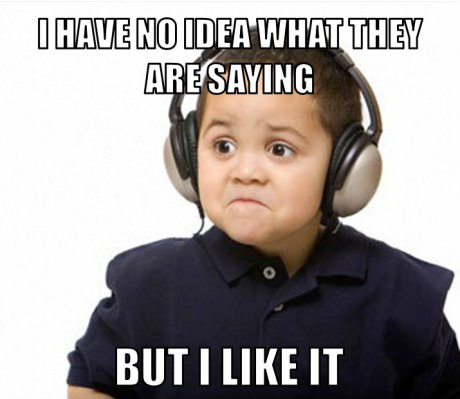
Vernacular is perhaps the most basic limit of the human body – it licenses us to get sustenance as a tyke, it grants us to get in every way that really matters anything we require as an adult, and it grants us various hours of delight through composing, radio, music, and motion pictures. This once-over (all together of least to most talked) consolidates the most basic vernaculars being utilized today.
10. French
Number of speakers: 129 million
Much of the time called the most nostalgic vernacular on the planet, French is talked in enormous measures of countries, including Belgium, Canada, Rwanda, Cameroon, and Haiti. Generous, and France too. We're exceptionally blessed that French is so surely understood, in light of the way that without it, we might have been swindled because of Dutch Toast, Dutch Fries, and Dutch kissing (ew!).
To say "hello there" in French, say "Bonjour"
9. Malay-Indonesian
Number of speakers: 159 million
Malay-Indonesian is talked – stun – in Malaysia and Indonesia. Truly, we kinda fudged the numbers on this one in light of the way that there are various tongues of Malay, the most standard of which is Indonesian. Regardless, they're all for all intents and purposes considering the same root lingo, which makes it the ninth most-chatted on the planet.
Indonesia is an enamoring spot; a nation made up of more than 13,000 islands it is the sixth most populated country on the planet. Malaysia borderlines on two of the greater parts of Indonesia (checking the island of Borneo), and is for the most part known for its capital city of Kuala Lumpur.
To say "hello" in Indonesian, say "Selamat pagi"
8. Portuguese
Number of speakers: 191 million
Consider Portuguese the little tongue that could. In the twelfth Century, Portugal won its opportunity from Spain and developed all around all through the world with the help of its commended explorers, for example, Vasco da Gama and Prince Henry the Navigator. (It's blessed Henry transformed into an aide . . . would you have the capacity to imagine if a kindred named "Ruler Henry the Navigator" transformed into a bloom merchant?) Because Portugal got in so at a lucky time the researching entertainment, the vernacular set up itself all over all through the world, especially in Brazil (where it's the national tongue), Macau, Angola, Venezuela, and Mozambique.
To say "howdy" in Portuguese, say "Bom dia"
7. Bengali
Number of speakers: 211 million
In Bangladesh, a country of 120+ million people, basically everybody conveys in Bengali. Besides, Bangladesh is basically incorporated by India (where the masses is growing so speedy, essentially breathing the air can get you pregnant), the amount of Bengali speakers on the planet is much higher than a considerable number individuals would envision.
To say "greetings" in Bengali, say "Ei Je"
6. Arabic
Number of speakers: 246 million
Arabic, one of the world's most prepared vernaculars, is talked in the Middle East, with speakers found in countries, for instance, Saudi Arabia, Kuwait, Iraq, Syria, Jordan, Lebanon, and Egypt. In addition, in light of the way that Arabic is the tongue of the Koran, countless in various countries convey in Arabic moreover. Such an expansive number of people have a working learning of Arabic, undoubtedly, that in 1974 it was made the sixth power vernacular of the United Nations.
To say "greetings" in Arabic, say "Al salaam a'alaykum"
5. Russian
Number of speakers: 277 million
Mikhail Gorbachev, Boris Yeltsin, and Yakov Smirnoff are among the a colossal number of Russian speakers out there. Without a doubt, we used to think of them as our Commie enemies. In the blink of an eye we think of them as our Commie colleagues. One of the six lingos in the UN, Russian is talked in the Mother Country, and also in Belarus, Kazakhstan, and the U.S. (to give a few illustrations places).
To say "hey" in Russian, say "Zdravstvuite"
4. Spanish
Number of speakers: 392 million
Close to those kids who take it in optional school, Spanish is talked in essentially every South American and Central American country, additionally Spain, Cuba, and the U.S. There is a particular energy for Spanish in the U.S., the same number of English words are gained from the lingo, including: tornado, bonanza, yard, quesadilla, enchilada, and taco grande transcendent.
To say "howdy" in Spanish, say "Hola"
3. Hindustani
Number of speakers: 497 million
Hindustani is the key vernacular of India's swarmed masses, and it conceals innumerable (of which the most for the most part talked is Hindi). While various anticipate that the quantity of tenants in India will soon surpass that of China, the perceptible nature of English in India keeps Hindustani from surpassing the most unmistakable tongue on the planet. In the event that you're enthused about taking in a little Hindi, there's a basic way: rent an Indian movie. The film business in India is the most gainful on the planet, making a colossal number of action/supposition/musicals reliably.
To say "hello" in Hindustani, say "Namaste"
2. English
Number of speakers: 508 million
While English doesn't have the most speakers, it is the official tongue of a greater number of countries than whatever other vernacular. Its speakers hail from all around the world, including New Zealand, the U.S., Australia, England, Zimbabwe, the Caribbean, Hong Kong, South Africa, and Canada. We'd told you more about English, be that as it may you probably feel better than average with the lingo starting at this point. We should essentially continue ahead to the most surely understood vernacular on the planet.
To say "greetings" in English, say "What's up, immensity?"
1. Mandarin
Number of speakers: 1 billion+
Stun, dumbfound, the most by and large talked lingo on the planet is arranged in the most populated country on the planet. Beating second-put English by a 2 to 1 extent, yet don't let that reprieve you into suspecting that Mandarin is definitely not hard to learn. Conveying in Mandarin can be genuinely great, since each word can be indicated in four ways (or "tones"), and a novice will ceaselessly encounter trouble perceiving one tone from another. Regardless, if over a billion people could do it, so would you have the capacity to. Have a go at making appropriate colleague!
To say "hello there" in Mandarin, say "Ni hao" (Nee HaOW).














